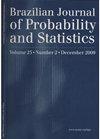零和/或一增广β矩形回归模型的贝叶斯推理
IF 0.5
4区 数学
Q4 STATISTICS & PROBABILITY
引用次数: 1
摘要
摘要在本文中,我们开发了一套完整的贝叶斯推理工具,用于零和/或一增广β矩形回归模型在新的参数化下分析有限增广数据。这种参数化促进了回归模型和推理工具的开发,并简化了各自的计算实现。提出的贝叶斯工具包括参数估计、模型拟合评估、模型比较(信息标准)、残差分析和案例影响诊断,这些工具都是通过MCMC算法开发的。此外,我们采用了可用的后验预测检验方法,使用适当的差异测量。我们进行了几项模拟研究,考虑了一些实际情况,旨在评估:先验灵敏度选择,所提出的模型和估计方法的参数恢复,转换观测到的0和1的影响,以及使用非增广模型,以及所提出的模型拟合评估和模型比较工具的行为。通过对一个心理测量真实数据集的分析来说明所开发工具的性能,说明所开发的分析框架的优点。本文章由计算机程序翻译,如有差异,请以英文原文为准。
Bayesian inference for zero-and/or-one augmented beta rectangular regression models
Abstract. In this paper we developed a full set of Bayesian inference tools, for zero-and/or-one augmented beta rectangular regression models to analyze limited-augmented data, under a new parameterization. This parameterization: facilitates the development of both regression models and inferential tools as well as make simplifies the respective computational implementations. The proposed Bayesian tools were parameter estimation, model fit assessment, model comparison (information criteria), residual analysis and case influence diagnostics, developed through MCMC algorithms. In addition, we adapted available methods of posterior predictive checking, using appropriate discrepancy measures. We conducted several simulation studies, considering some situations of practical interest, aiming to evaluate: prior sensitivity choice, parameter recovery of the proposed model and estimation method, the impact of transforming the observed zeros and ones, along with the use of non-augmented models, and the behavior of the proposed model fit assessment and model comparison tools. A psychometric real data set was analyzed to illustrate the performance of the developed tools, illustrating the advantages of the developed analysis framework.
求助全文
通过发布文献求助,成功后即可免费获取论文全文。
去求助
来源期刊

Brazilian Journal of Probability and Statistics
STATISTICS & PROBABILITY-
CiteScore
1.60
自引率
10.00%
发文量
30
审稿时长
>12 weeks
期刊介绍:
The Brazilian Journal of Probability and Statistics aims to publish high quality research papers in applied probability, applied statistics, computational statistics, mathematical statistics, probability theory and stochastic processes.
More specifically, the following types of contributions will be considered:
(i) Original articles dealing with methodological developments, comparison of competing techniques or their computational aspects.
(ii) Original articles developing theoretical results.
(iii) Articles that contain novel applications of existing methodologies to practical problems. For these papers the focus is in the importance and originality of the applied problem, as well as, applications of the best available methodologies to solve it.
(iv) Survey articles containing a thorough coverage of topics of broad interest to probability and statistics. The journal will occasionally publish book reviews, invited papers and essays on the teaching of statistics.
 求助内容:
求助内容: 应助结果提醒方式:
应助结果提醒方式:


